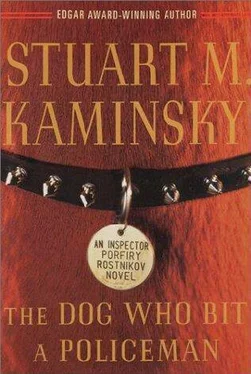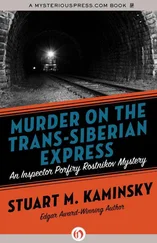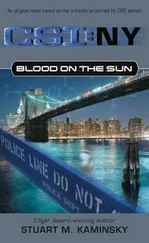Stuart Kaminsky - The Dog Who Bit a Policeman
Здесь есть возможность читать онлайн «Stuart Kaminsky - The Dog Who Bit a Policeman» весь текст электронной книги совершенно бесплатно (целиком полную версию без сокращений). В некоторых случаях можно слушать аудио, скачать через торрент в формате fb2 и присутствует краткое содержание. Жанр: Полицейский детектив, на русском языке. Описание произведения, (предисловие) а так же отзывы посетителей доступны на портале библиотеки ЛибКат.
- Название:The Dog Who Bit a Policeman
- Автор:
- Жанр:
- Год:неизвестен
- ISBN:нет данных
- Рейтинг книги:3 / 5. Голосов: 1
-
Избранное:Добавить в избранное
- Отзывы:
-
Ваша оценка:
- 60
- 1
- 2
- 3
- 4
- 5
The Dog Who Bit a Policeman: краткое содержание, описание и аннотация
Предлагаем к чтению аннотацию, описание, краткое содержание или предисловие (зависит от того, что написал сам автор книги «The Dog Who Bit a Policeman»). Если вы не нашли необходимую информацию о книге — напишите в комментариях, мы постараемся отыскать её.
The Dog Who Bit a Policeman — читать онлайн бесплатно полную книгу (весь текст) целиком
Ниже представлен текст книги, разбитый по страницам. Система сохранения места последней прочитанной страницы, позволяет с удобством читать онлайн бесплатно книгу «The Dog Who Bit a Policeman», без необходимости каждый раз заново искать на чём Вы остановились. Поставьте закладку, и сможете в любой момент перейти на страницу, на которой закончили чтение.
Интервал:
Закладка:
“They laugh at nothing,” Anatoli, sitting on the curb, said to no one. “At nothing. Not that there is anything to laugh at if you are not rich.”
Anatoli shook his head. A little drink would be nice, but Anatoli knew better than to ever remove a bottle from the Albuquerque Bar. And so he sat, shoulders down, a huge burp and sigh escaping from him. He should go home, crawl into the narrow bed in the closet in his daughter and son-in-law’s apartment, but he wasn’t quite sure where the apartment was. Things seemed to be turned this way and that tonight. It had always been difficult for Anatoli, but since the revolution had ended and the street names had been changed, it had become worse.
He shifted his right foot, which was growing stiff, and kicked something hard, something in the street next to the curb. The streetlights were dim so Anatoli leaned over to look at the object.
“What’s this? What’s this?” he said, reaching over and picking up the object. “A gun. A weapon. A thing that shoots.”
He held the gun in his hand. It was heavy. He had no idea what kind of gun it was or even, with certainty, that it was real.
“I found a plotka, a gun,” he said aloud. “A weapon. Is this a thing or is this a thing? I could shoot it. I could sell it.”
Anatoli looked at the black pistol in his hand and held it out.
He had never held a gun in his hand. He pulled the trigger. The gun fired and sent him backward. He hit his head on the sidewalk and sat up quickly, at least as quickly as he could with the aid of gawky elbows and arthritic fingers.
He looked across the street. The gun had made a loud noise and the breaking of glass in a window across the street had created an almost musical follow-up.
“It’s a real gun,” Anatoli said, bracing himself with his left hand and firing again with his right hand.
This time the bullet hit brick or concrete and Anatoli saw a spark of light when it struck.
“I think I should get up and get the hell out of here before I am in big trouble,” he said, still carrying on his conversation with the empty street. “I am a cowboy. I am a cowboy with a gun. All I need is a horse and one of those hats. I am going home.”
The problem was that getting up from the curb was now a major chore that he could not accomplish. Oh, he was capable, but Moscow would not cooperate. It kept swaying. He placed the gun in his lap and began singing. The song he sang was “Baby Face.”
Anatoli didn’t know it was an American song. He only knew the Russian words.
“You got the cutest little baby face,” he bellowed hoarsely.
Across the street, three buildings down, Misha Vantolinkov had had enough. He had been awakened by gunfire on his street before.
He had been awakened by gangs of kids shouting obscenities, but the loud croaking of the drunken Anatoli got to him. Besides, the drunk had the words to the song wrong.
Misha, who had to get up at six to get to his job at the reception desk of the Space Museum, turned on the lights and picked up his major luxury, the telephone. He called the police, giving the location but not his name, told them a lunatic drunk was shooting a gun in the street, and then he hung up.
Anatoli Dudniki was singing even more loudly, “I’m up in the sky when you give me a hug,” when Misha got back in bed and covered his head with his pillow.
Ten minutes later a patrol car with two young policemen in it pulled up at the curb. The policemen got out, guns in hand, and ordered Anatoli to stop singing and put down the gun.
Anatoli complied and grinned, showing his few remaining teeth and a look of gratitude.
“I’m not at home,” Anatoli said as he put the gun in the street.
“I have a name, a medal, a daughter, a bed. That is where I would like you to take me, comrades. Oh, I forgot, no more ‘comrades.’
Citizen policemen. I am at your mercy. Get me home.”
He staggered toward the policemen and fell into the arms of the younger one, almost knocking him over.
Eleven minutes beyond that, Anatoli was in a small damp cell in the nearest police lockup. The lockup was located next door to a paper-clip factory whose metal cutting machines throbbed all night and all day.
“This,” he announced with confidence, “is not my bed. I want my bed. This is now a free country. I am a citizen.”
“And,” said the policeman, standing over him as Anatoli sat,
“you have murdered a woman. One of those shots went through a window and killed a young mother.”
“Killed?” said Anatoli, looking at the policeman.
Seconds later, he was asleep.
Raisa Munyakinova sat in the only reasonably comfortable chair in her minuscule apartment. They called it an apartment, but it was just a room. It was enough for her. She had work. She had a place to live. She would survive losing track of the days, having to carefully write her work schedule on the back of a flyer for Canadian cereal and place it under a glass on her tiny table.
The detective who looked like a ghost had not frightened her. It was not fear that now kept her awake. It was her decision to identify the man who had been with Valentin Lashkovich before he was murdered.
In a few hours, with the sky full dark, Raisa would get dressed and go to work and when she was finished take a bus to Petrovka to meet the ghost detective. She would look at photographs. She knew the face of the man she would be looking for. Would she have the strength to identify him? Or should she simply say, “He is not here,” and go on with the life she had chosen and which had chosen her?
She had just returned from her night of work. She was tired, so tired that the idea of just rising from the chair to get to her bed was too much effort.
In the darkness, her head turned to the curtain in the corner. Behind the curtain was a cardboard box. It was not a particularly large box. From time to time she took the box out and removed items and memories, touched and examined them and put them back. It was her past and it was painful, but compelling. Whenever she went through the contents of the box, she smiled and wept.
She got up wearily, turned on the small sixty-watt table light and moved to the curtain. The meaning of her life was beyond that curtain in a cardboard box. She wondered how many others in Moscow kept their meaning in boxes behind the curtains.
Although Bronson was a dog, that did not mean he had no thoughts. On the contrary, he had many thoughts, but they were fleeting and he had almost no control over them.
Even now, as he lay in his large metal cage in the darkness, with only the dim night-light through the single small slit of a window, thoughts came racing through the head of the huge dark animal.
An image of a human bringing something heavy down on his back stirred the dog, but it was instantly gone, forgotten till the next time. A spark of a memory of looking into the eyes of another dog whose neck he had held with his best bloody grip rolled by on a wave. He felt the death of that other dog and it became part of the wave of death of many dogs. And that too passed.
Memories did not linger consciously in Bronson. He felt, but did not think, that he would soon be facing another dog in the circle.
Smelly, shouting humans would be there, some calling the name he had been given. His body would quiver with memories so deep that they went back to the wild free days of his ancestors in the forests.
And then the thing would take over and he would attack. There was no plan, no thought. Bronson would give himself over to the ancient memory of survival, and it would either carry him through the triumph over the dead or dying other or leave him lying in the scent of his own death.
But none of this frightened the dog. Fear simply was not a part of his being. Nor did he think in terms of success or failure. He simply existed to live and fight and for the praise of the human who provided food and shelter.
Читать дальшеИнтервал:
Закладка:
Похожие книги на «The Dog Who Bit a Policeman»
Представляем Вашему вниманию похожие книги на «The Dog Who Bit a Policeman» списком для выбора. Мы отобрали схожую по названию и смыслу литературу в надежде предоставить читателям больше вариантов отыскать новые, интересные, ещё непрочитанные произведения.
Обсуждение, отзывы о книге «The Dog Who Bit a Policeman» и просто собственные мнения читателей. Оставьте ваши комментарии, напишите, что Вы думаете о произведении, его смысле или главных героях. Укажите что конкретно понравилось, а что нет, и почему Вы так считаете.












